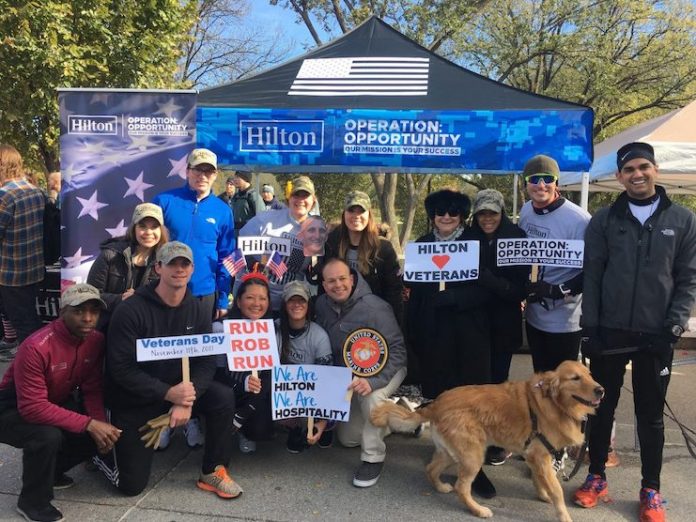
Hilton recently announced that it had achieved its Operation: Opportunity target of hiring 30,000 veterans, military spouses, and caregivers over the past six years across hotels, corporate offices, and work-from-home positions in the United States. To celebrate the milestone, Hilton has pledged to build on its reputation as a military-friendly company and expand its commitment to hire 25,000 additional veterans, spouses, and caregivers by 2025.
Melissa Stirling, PMP, Senior Director, U.S. Military and Youth Programs at Hilton describes the problem of unemployment among veterans and spouses of those still on active duty. “The unemployment rate among veterans has historically been higher than the general population, but it’s dramatically higher among the active-duty spouses who are relocated along with their partners.”
Although Stirling notes that the company’s commitment to the military is longstanding and ever-evolving, as a result of two events in 2013, they stepped up their efforts. “That’s when the vet unemployment rate hit double digits and then–First Lady Michele Obama announced Joining Forces, an initiative to employ military spouses. Since then, a lot of companies have become involved, but Hilton was proud to be one of the leaders.”
As part of this initiative in 2013, the company hired Air Force veteran Abie Chong as Military Talent Recruiting Manager. Chong, who spent 30 years in the military, observes that those who have served have many of the same skills needed at hotels, the largest of which have up to 23 different departments. “Because a lot of their skills are transferrable, they can be a natural fit for many properties. In addition, many have served in different environments and situations, and are used to working in small teams and getting the mission done.”
Stirling says spouses, in particular, represent an especially rich talent pool due to how they typically spend “downtime” during deployments. “Many take online classes; they may also hold high-level volunteer positions in the military. As a result, they’re highly educated and have these amazing skills.” Hilton’s work-from-home positions, such as Hilton Reservations Customer Care, in particular, suit spouses because they offer job portability and a road to career advancement, she says. “Instead of training up, then leaving, they take their jobs with them—so when they get orders to move, their job goes with them.” Another option that works well for military spouses is to take their Hilton training with them by going from one Hilton property to another when relocated.
Along with hiring, Hilton’s Operation: Opportunity provides enhanced training and development opportunities and comprehensive benefits truly tailored for the veteran community. These include:
- Employment Readiness: Supporting veterans and spouses with re-training opportunities, virtual and physical career fairs, and virtual sessions for resume and interview tips.
- Corporate Responsibility: Committing to community service projects and in-kind donations for organizations such as Team Rubicon, USO, Hidden Heroes, and Warrior Canine Connection.
- Perks and Benefits: Enhancing military leave benefits and strengthening military discounts and promotions for military guests and Team Members.
- Military-Friendly Culture: Collaborating with Hilton’s Learning and Development Team to help transition service members, facilitating events, sponsorships and networking for military team members, increasing the number of veteran-owned business suppliers, and providing online community forums and an internal transfer system for military spouses.
To position military hires for success, Hilton also offers additional extensive resources and support programs, including reserve pay benefits, a flexible work environment, tailored development resources, internship programs, on-the-job training, a dedicated Military Team Member Resource group and special recognitions for veterans and military spouses.
Stirling and Chong say it’s not enough to coach veterans and spouses on preparing their resumes and interview skills; they also need to teach those in a position to hire them how to read their resumes and see the value in their experience. “A resume of a vet or spouse coming out of active duty is written differently when applying for a military role than it would be for a civilian role. Civilians don’t always know how to translate a military resume. So we work with our hiring managers to provide advice on how to interpret a military resume, then work with vets and spouses on how they can make their resume more civilian friendly, and hope they can meet in the middle,” says Stirling.
Chong points out that part of his role is being something of an ambassador for the hospitality industry. “Hospitality is not one of these career choices that is at the top of newly separated veterans’ shortlist when they’re thinking of transitioning. Part of my job is making them aware of all the wonderful opportunities that Hilton and the hospitality industry offer.
Military spouse Kathleen Hankard, Development Coach for the Hilton Customer Care and Reservations Team, appreciates not just her own job but being in a company whose culture supports the military community. “I love working for a company that shares many of the same values of myself and my fellow military spouses and veterans —purpose before self, community and sustainable giving. I can really feel at home at Hilton.”











